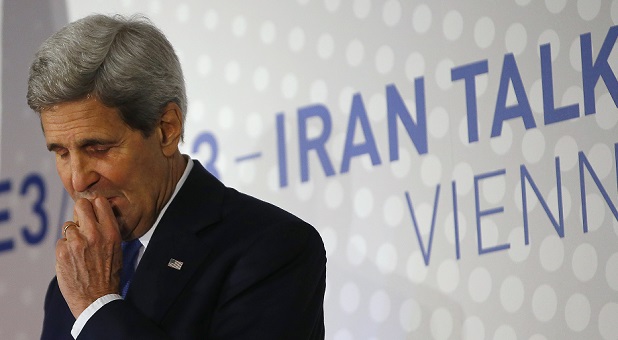Iran’s Path to the Bomb
Want to judge the value of an international deal? Grade it not by measuring what it means to the United States, but what it means to the other guy. That’s the standard that ought to be applied to the recently reached Iran deal. Remember the Paris Peace Accords? They were anything but. In 1973, all the U.S. wanted from North Vietnam before the president pulled out every American combat troop was an assurance that the other side would respect the independence of South Vietnam. But that was one point they were never willing to concede. The result of the “peace” deal ended with refugees scrambling to reach helicopters as the North Vietnamese army marched into Saigon. All President Barack Obama asked for in Vienna, where the Iran deal was reached, was an assurance from the government in Tehran that it wouldn’t build a nuclear weapon. From the White House perspective, it got what it wanted. “Every pathway to a nuclear weapon is cut off,” Obama declared. But look at the agreement from Tehran’s perspective. It is clear that before the deal, they were intent on building a nuclear weapons breakout capability. Sure, they acknowledge in the new deal they will never build a bomb. That’s consistent with what the regime has said in the past: “We have never pursued or sought a nuclear bomb,” Iranian President Hassan Rouhani affirmed last year, “and we are not going to do so.” Nobody really believes that. If anyone did, there wouldn’t have been a need for the negotiations to begin with. The nuclear and missile infrastructure the regime has built parallels the efforts made by both Pakistan and North Korea before they became breakout nuclear powers. There is no reason to assume Tehran’s goal is any different. So if Tehran wants a bomb, the real issue is do they believe this deal will keep them from getting one? The answer is no. We know that, because it’s not hard to map out the path to how Iran will get a nuclear arsenal. Iran already has the infrastructure it needs, and the deal doesn’t require them to fully divest any of it. Further, Tehran can continue research and development and expanding its missile program. Meanwhile, in the short term, the regime has every incentive to scrupulously comply with the deal. Why not? It comes at no cost and in return delivers sanctions relief and unprecedented access to global markets. By some accounts, Tehran can expect a $300 billion to $400 billion cash infusion into the country’s cash-strapped economy. Much of that money will flow through the hands of the regime. At the same time, fueled by a flood of greenbacks, Tehran can ramp up its aggressive foreign policy and strengthen its position in the region. Given the stamp of credibility from the recent agreement, Iran can also ramp up its complaints about others. Since it has sworn off nuclear weapons, it can demand the West end its missile defense programs, cut off arms sales to other Middle East states, and crack down on other regional powers that might want their own nuclear weapons, as well as insist Israel divest its nuclear arsenal. “Why not,” Tehran will argue, “all these are a threat to us. The Vienna agreement proves we are peaceful. Everyone else needs to back off.” In a year or so, after it’s filled its coffers, destabilized the balance of power in the region, and tightened its control over the people of Iran, the regime can reassess what it thinks about the Vienna Agreement. And it just might find the deal no longer makes sense. Iran can team with other countries such as North Korea, China or Russia and quickly jump-start its program and become a declared nuclear power – but now from a position of strength – a regional hegemon, an iron-clad dictatorship, and a wealthy power that’s part of the global marketplace – not isolated from it. From Iran’s perspective, this is a deal worth having – particularly if its goal is to be a powerful country and have a bomb. – James Jay Carafano is vice president of the Davis Institute for National Security and Foreign Policy and the E. W. Richardson Fellow at The Heritage Foundation. Reprinted from The Heritage Foundation.






































